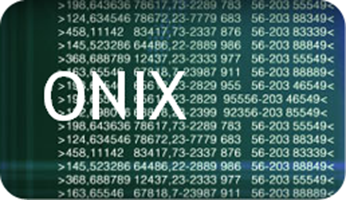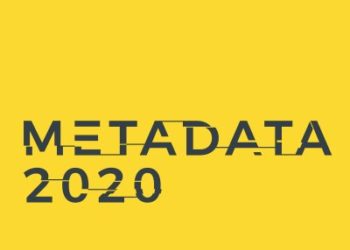Editor’s Note: Today’s post is by Abigail Wickes and Erica Leeman. Abigail is the Discoverability Associate at Oxford University Press (OUP), managing relationships with discovery partners and working to ensure OUP metadata meets industry standards. Erica is the Metadata Associate at the MIT Press (MITP), where she assists with developing, implementing, and maintaining metadata standards and workflows to help the Press become a more metadata-informed publisher.
ML(I)S traditionally stands for “Master of Library (and Information) Science”, but we (Erica Leeman and Abigail Wickes) are metadata-loving librarians working in scholarly publishing who give this familiar acronym a new meaning – Metadata Librarians In Scholarly publishing. We met giving early career lightning talks at the 2018 SSP conference and bonded over the many things we have in common. As we continued to compare notes, we realized that our early career experiences, the value of an MLIS degree across the industry, and the need for metadata expertise in publishing are all topics that could be opened to a wider audience via the Scholarly Kitchen. By sharing our ongoing conversation, we hope to bring attention to importance of metadata in scholarly publishing and the exponential effects of investing in quality metadata.

Abigail (AW): Erica, I remember reading your bio before the lightning talks and thinking, “I have to talk to this person; it sounds like her pathway to scholarly publishing has so much in common with mine!” It is sometimes said that nobody sets out to work in scholarly publishing; how did you get started in your current role?
Erica (EL): I heard the joke about falling into scholarly publishing so many times at SSP this year, and it’s definitely true for me. I attended library school in Boston at Simmons College (go Sharks!), and I focused my classes around cataloging and metadata, intending to eventually have a career in technical services. After I graduated, I was working a short-term job at Harvard Law School and casting around trying to find something more permanent that would utilize my degree when three of my friends each independently sent me the job posting for a Metadata Associate at the MIT Press. They all said it sounded perfect for me, and they were right! The Press basically wanted to hire a weirdo who loves metadata and would be willing to contribute to metadata education and socialization with Press staff. And I’ve been that weirdo for two years now!
Did you also get here accidentally, Abigail, or are you one of the few who came into scholarly publishing intentionally?
AW: When I graduated from library school I also applied to many cataloging and metadata-focused jobs, but I was open to branching out into corporate and vendor environments. Publishing jobs with an emphasis on bibliographic data analysis have turned out to be a great fit. My first job out of library school was a contract role to create a taxonomy for several thousand custom apps at LexisNexis, and I relied on my understanding of classification and FRBR entities (Functional Requirements for Bibliographic Records) to build a controlled vocabulary and hierarchy to describe this collection. When that project was complete I worked for about a year-and-a-half in a marketing analyst position at OUP before my current position managing relationships with discovery services was created. I’m really enjoying this role; I’m learning so much more about the library and discovery industry, and understanding how librarians are trained to think about and work with bibliographic data has been extremely useful.
EL: It’s funny that you mention taxonomy because my enthusiasm for taxonomies was part of what landed me this job. I had taken a class specifically about indexing and taxonomies, and one of the first priorities for the Metadata Associate was to create a subject taxonomy for MITP. I might have been the only applicant who visibly lit up at the mention of this project and enthused about how much fun it would be. You’re probably seeing now why I used the word “weirdo” before.
AW: From one weirdo to another. That sounds like a really interesting project! What other projects were on your to-do list when you started?
EL: The specific goals for this position when I was hired were pretty ambitious, probably because the position was brand new and the shape it would take wasn’t entirely clear yet. My role in general has always been characterized as assisting with developing and implementing key aspects of metadata strategy, and that has never changed. But when I started, there was a long wish list of projects for the Metadata Associate, things like creating the taxonomy, data cleanup, creating and improving workflows (for chapter-level metadata, keywords, translations of metadata), managing and improving the communication between various databases, and compiling a list of every single book the Press has published since the very first one in 1926. Priorities shift over time, so some of those projects have been accomplished (by me or by others) while others have moved to the back of our minds to make room for new initiatives.
Two years in, my role looks a little different. A significant piece of my role that was not envisioned at the beginning is facilitating the Press’s relationship with vendors who distribute our ONIX feed and create MARC records and KBART files. My library education definitely comes in handy when dealing with MARC records, and I’m asked by coworkers sometimes to explain the importance of MARC and KBART for libraries. I do resolve metadata inconsistencies, as was originally envisioned, both within our internal databases and between other platforms and retail sites. And I do participate in the discussion and decision-making process for major metadata changes, updates, or additions (like changing how we handle imprints internally or updating our taxonomy).
What about you, Abigail? What did your position look like when you started, and has it changed or stayed the same over the last few years?
AW: I’m also the first person to hold this role at OUP; it seems like more and more publishers are starting to devote resources to discovery management. When I was hired, my main priorities were ensuring OUP is compliant with key discovery standards (particularly KBART and the NISO Open Discovery Initiative), partnering with various teams to support customer needs, tracking where our content is indexed, and finally managing our existing discovery and abstracting & indexing relationships and cultivating new partnerships.
Because discovery is adjacent to so many areas of the business, I’ve found that developing internal relationships is also extremely important. I need the right teams at OUP to know to get in touch with me when we are launching a mid-year journal, making URL changes, or retracting content so I can then pass that information to my discovery contacts.
EL: Interesting. Our jobs are really different, but we’re both often relying on the skills we acquired with our MLIS. Do you have any fun anecdotes about solving or improving publishing problems with the help of your trusty MLIS?
AW: Discovery and library industry jargon is full of acronyms, products that have changed names or ownership, IDs of varying reliability, and customers who are fluent in library-ese but need to express their needs to publishers who may not be. Translating these questions and developing tools (FAQs, glossaries, cheat-sheets, etc.) for my customer-facing colleagues is one of my favorite parts of my job.
I’m also starting to think about how publishers can translate their perspectives and contexts to librarians. I had the good fortune to be part of the NISO KBART Automation working group last year, which was tasked with putting together use cases and a prototype for delivering KBART files customized to institutional holdings. Most publishers provide KBART files based on standard sales packages, and there are many instances in which library holdings are slightly different, such as evidence based or title by title acquisition models or honoring old agreements post-journals migrations. Providing KBART files based on institutional holdings would solve a lot of problems; there’s a clear market demand for this service, so why aren’t more publishers providing it? Communicating how difficult it is to join complex institutional holdings data to bibliographic metadata from multiple, isolated, legacy platforms is a content provider perspective I’m currently trying to articulate.
EL: I’m also on a NISO working group right now, and our goal is to issue a recommended practice for ebook metadata. There are librarians, publishers, service providers, and preservationists in the group, and being able to both understand librarian-speak and also explain publishers’ concerns has been very helpful. FRBR has come up a couple of times, which is a sure-fire way to create confusion when publishers are in the room. The concept of a work is particularly frustrating since the word “work” in publisher-speak is essentially the same as the word “expression” in FRBRese.
As the relationship manager for our MARC records vendor, I’m often translating things in both directions, publisher to librarian and back. I have to understand the needs and desires of the product team on our side, figure out how that impacts MARC and KBART, phrase questions to the vendor, and translate the responses into something the product team can understand and use. This communication would be much more challenging if I didn’t have that understanding of MARC.
Surprisingly, nothing related to MARC was intended to be part of my role when I was first hired. When we decided to start working with a vendor to get MARC and KBART, it was very convenient that I had this prior knowledge, but my MLIS has been useful in lots of other circumstances, too. I think what the Press really wanted in a Metadata Associate was someone who understood metadata in an abstract way and could explain what makes good metadata good, regardless of which particular standard you’re trying to fulfill the minimum requirements of at any given moment. It’s useful to be able to contextualize why standards matter, why certain things are required, and why an individual should care about metadata.
AW: MARC also wasn’t on my job requirements, but explaining the function of MARC and KBART is also something I find myself doing frequently. Content providers may not always have the full picture of how this metadata is used, so I often find myself providing the context of how library customers work with standard bibliographic data. You can think of it like building a house–a doorknob provider might create the most definitive, beautiful doorknobs, but if they don’t actually fit into any standard size doors and require bespoke door fittings no one is going to be as excited to buy them.
EL: I’m constantly amazed at how much overlap there is between our two completely different roles in scholarly publishing. I love being able to commiserate with you about the challenges but also learning from you in the areas where our experiences are different. I’m glad we met at SSP and had the opportunity to start this conversation, which I’m sure we’ll continue. And, of course, there are others talking about these same issues; we’re never truly alone.
AW: We’re definitely not the only ones having this conversation. For anyone in similar shoes, I highly recommend looking at the work of Marshall Breeding, Chef Lettie Conrad, Chef Lisa Janicke Hinchliffe, Aaron Tay, and Julie Zhu. We also have some interesting discussion in our Content Discovery Management Google Group. If you, dear reader, want to join the conversation, or if you have any helpful resources to recommend, please reach out to us in the comments!
Discussion
18 Thoughts on "MLIS: Metadata Librarians In Scholarly publishing"
This is a great discussion – thank you! I’m a current MLIS student with a bachelor’s in publishing, and I’ve been struggling in my metadata class this semester. This has motivated me to keep pushing through and finding those larger connections within the scholarly discussion. Thanks!
Hi Laura,
I bet your bachelor’s in publishing is a really helpful background! I had trouble in my Metadata survey course as well, just because there are so many formats out there with so many different granularity levels/walk-throughs/purposes/etc. It was even hard to understand whether something was more like a conceptual framework or whether it was an actual format. Ultimately it gave me a semi-working vocabulary that I was able to draw from when I had some actual projects to apply this surface-level knowledge to. Looking back I wish I had thought about it more in terms of what part of the industry typically uses what formats. Thanks for commenting! 🙂
Thank you for this wonderful conversation. As a current MLIS student, I was curious to know which classes in library school you found most crucial for your current work.
Hi Monica,
Thanks for commenting! Interestingly my Special Libraries course has been the most applicable–since special librarians are often working solo in an office of non-librarians we learned a lot about marketing library services in a non-library environment, which is a big part of what I do now in terms of making internal connections. All of the cataloging courses were also really helpful.
Hi Monica,
I mentioned a class I took on indexing and taxonomies, which ended up having a very direct application to my work. My more general Metadata class (not a traditional cataloging course) was also very helpful because I learned XML there and was exposed to a lot of metadata standards beyond MARC. That experience helped me pick up publishing’s ONIX standard pretty easily.
Metadata and an intense interest in XML tagging generally and how it can be used for connecting content in a content corpus and across diverse publications has been my career for years (not in library science but in online publishing). I love metadata 🙂 so I definitely can relate to all of this.
This was a really insightful read, and I feel like I’ve finally found my counterparts at other publishers. I was once a tech services librarian who felt the draw the scholarly publishing. Now I’m at Wiley, in a newly created position, where I strive to achieve many of the same things. Sorting metadata distribution issues with vendors and librarians, ensuring adherence to standards, and demystifying the ever-growing list of acronyms to customer-facing colleagues are a part of my daily job. Never when I was at library school, did I think I’d be here, but now I am and I love it. I’m eager to be a part of this conversation and hear more of what you and other colleagues have to say.
Thanks for commenting! Sounds like you should join our Google Group. 🙂
When I was reading this, I couldn’t help but to hear it like a Story Corps recording on NPR. You two need to get a podcast–Ask the Metadata Wonder Twins!
Great post. Just from this interchange: FRBR, MARC, KBART, ONIX, XML, URL and the NISO Open Discovery Initiative. Exhausting! It was the first I’d heard of KBART, which, I learn upon searching, was established by NISO in 2010. The practice of metadata becomes constantly more complex, and that makes it so, so, difficult to get my publishing clients fully onboard.
Keep fighting the good fight, I think more and more publishers are catching on. And you can always point to the MIT Press as a success. Your assessment and advice helped catalyze a culture change here — including creating my position, so I personally owe you a lot!
Thank you both for this really interesting conversation! As someone who worked for nearly 30 years in secondary publishing, I’ve always argued that metadata and taxonomy skills are fundamental to the digital content ecosystem and was always perplexed (and frustrated) that primary publishers didn’t seem to value these skills very much. Finally the complexity involved, and the resources required, to develop and manage taxonomies and to ensure the quality of publisher-generated metadata is being recognised, and it’s very encouraging to hear of three major publishers who have recently created new roles to cover these responsibilities. Long may it continue! Good luck with your future careers, both of you!
While reading the thread, I was going through my journey too. Very thoughtfully written to help both – content providers and content users. When I studied my MLIS, there was a subject called “Universe of Knowledge” which describes the basics of all subjects and being a Librarian, you require to learn the basics of each subject to become the master. Kudos !!! Yes, I work for publisher too from January 2017 onwards, after 26 years of career in Library and Information Science, have worked for telecommunications, business, law, special libraries, academic libraries, public libraries.
As I was reading this, I thought, “I could’ve written this!” I share your love of metadata. I also have an MLIS and work for a database vendor. I’m constantly working the importance of quality metadata into conversations, even though managing metadata isn’t under my purview.
This is such a great read! Working in publishing metadata, for a long time I didn’t know anyone else who did my work. I think the first 7 years of my career was trying to explain in-house why Metadata is important and how sales hinges on it. These days there’s much greater acknowledgement, but there’s still a certain amount of education in-house as to how these different topics work and affect business. Abigail, I love your “doorknob” analogy! Looking outside of publishing, I think many are surprised how much Publishers in general struggle with streamlining their different legacy systems, some of which were never designed to speak to each other. At Springer Nature, we just released our KBART Automation, and I’m really excited to see some of the benefits – in my mind it is very worth the battle to get the different systems together and I hope more publishers are inspired to take the plunge!
Hello. Great read! Would you please add me to the Content Discovery Management Google Group?
Thank you.
Suzanne Daulerio
Product Manager
ASTM International
Hi Suzanne,
Thanks for your interest! I think you can request via the link above, but if that doesn’t work message me with your email on LinkedIn and I’ll add you directly.
This is a wonderfully informative (and fun to read!) dialogue, and especially timely and relevant because we have a very similar “MLIS” position open here at Project MUSE for which we are currently in search of suitable candidates. If you know of anyone who might be a good fit, please send them our way!



